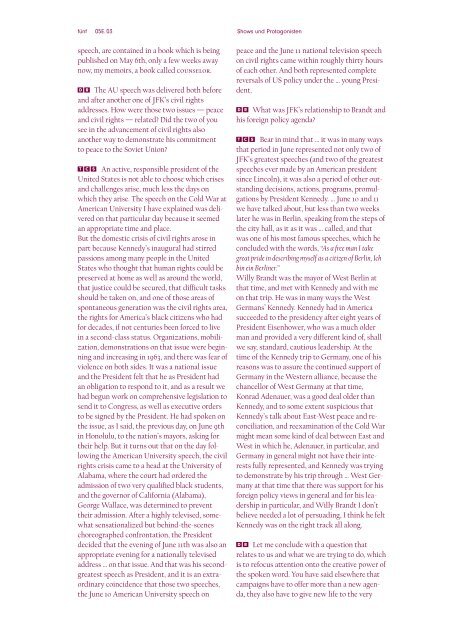KUNST DER DEMOKRATIE - Die Redner
KUNST DER DEMOKRATIE - Die Redner
KUNST DER DEMOKRATIE - Die Redner
Sie wollen auch ein ePaper? Erhöhen Sie die Reichweite Ihrer Titel.
YUMPU macht aus Druck-PDFs automatisch weboptimierte ePaper, die Google liebt.
fünf 05E. 03 Shows und Protagonisten<br />
speech, are contained in a book which is being<br />
published on May 6th, only a few weeks away<br />
now, my memoirs, a book called counselor.<br />
The AU speech was delivered both before<br />
and after another one of JFK’s civil rights<br />
addresses. How were those two issues — peace<br />
and civil rights — related? Did the two of you<br />
see in the advancement of civil rights also<br />
an other way to demonstrate his commitment<br />
to peace to the Soviet Union?<br />
An active, responsible president of the<br />
United States is not able to choose which crises<br />
and challenges arise, much less the days on<br />
which they arise. The speech on the Cold War at<br />
American University I have explained was delivered<br />
on that particular day because it seemed<br />
an appropriate time and place.<br />
But the domestic crisis of civil rights arose in<br />
part because Kennedy’s inaugural had stirred<br />
passions among many people in the United<br />
States who thought that human rights could be<br />
preserved at home as well as around the world,<br />
that justice could be secured, that difficult tasks<br />
should be taken on, and one of those areas of<br />
spontaneous generation was the civil rights area,<br />
the rights for America’s black citizens who had<br />
for decades, if not centuries been forced to live<br />
in a second-class status. Organizations, mobilization,<br />
demonstrations on that issue were begin-<br />
ning and increasing in 1963, and there was fear of<br />
violence on both sides. It was a national issue<br />
and the President felt that he as President had<br />
an obligation to respond to it, and as a result we<br />
had begun work on comprehensive legislation to<br />
send it to Congress, as well as executive orders<br />
to be signed by the President. He had spoken on<br />
the issue, as I said, the previous day, on June 9th<br />
in Honolulu, to the nation’s mayors, asking for<br />
their help. But it turns out that on the day following<br />
the American University speech, the civil<br />
rights crisis came to a head at the University of<br />
Alabama, where the court had ordered the<br />
admission of two very qualified black students,<br />
and the governor of California (Alabama),<br />
George Wallace, was determined to prevent<br />
their admission. After a highly televised, somewhat<br />
sensationalized but behind-the-scenes<br />
choreographed confrontation, the President<br />
decided that the evening of June 11th was also an<br />
appropriate evening for a nationally televised<br />
address … on that issue. And that was his secondgreatest<br />
speech as President, and it is an extraordinary<br />
coincidence that those two speeches,<br />
the June 10 American University speech on<br />
peace and the June 11 national television speech<br />
on civil rights came within roughly thirty hours<br />
of each other. And both represented complete<br />
reversals of US policy under the … young President.<br />
What was JFK’s relationship to Brandt and<br />
his foreign policy agenda?<br />
Bear in mind that … it was in many ways<br />
that period in June represented not only two of<br />
JFK’s greatest speeches (and two of the greatest<br />
speeches ever made by an American president<br />
since Lincoln), it was also a period of other outstanding<br />
decisions, actions, programs, promulgations<br />
by President Kennedy. … June 10 and 11<br />
we have talked about, but less than two weeks<br />
later he was in Berlin, speaking from the steps of<br />
the city hall, as it as it was … called, and that<br />
was one of his most famous speeches, which he<br />
concluded with the words, “As a free man I take<br />
great pride in describing myself as a citizen of Berlin, Ich<br />
bin ein Berliner.”<br />
Willy Brandt was the mayor of West Berlin at<br />
that time, and met with Kennedy and with me<br />
on that trip. He was in many ways the West<br />
Germans’ Kennedy. Kennedy had in America<br />
succeeded to the presidency after eight years of<br />
President Eisenhower, who was a much older<br />
man and provided a very different kind of, shall<br />
we say, standard, cautious leadership. At the<br />
time of the Kennedy trip to Germany, one of his<br />
reasons was to assure the continued support of<br />
Germany in the Western alliance, because the<br />
chancellor of West Germany at that time,<br />
Konrad Adenauer, was a good deal older than<br />
Kennedy, and to some extent suspicious that<br />
Kennedy’s talk about East-West peace and reconciliation,<br />
and reexamination of the Cold War<br />
might mean some kind of deal between East and<br />
West in which he, Adenauer, in particular, and<br />
Germany in general might not have their interests<br />
fully represented, and Kennedy was trying<br />
to demonstrate by his trip through … West Germany<br />
at that time that there was support for his<br />
foreign policy views in general and for his leadership<br />
in particular, and Willy Brandt I don’t<br />
believe needed a lot of persuading, I think he felt<br />
Kennedy was on the right track all along.<br />
Let me conclude with a question that<br />
relates to us and what we are trying to do, which<br />
is to refocus attention onto the creative power of<br />
the spoken word. You have said elsewhere that<br />
campaigns have to offer more than a new agenda,<br />
they also have to give new life to the very


